
Lieutenant-Colonel Charles Richard John Spencer-Churchill, 9th Duke of Marlborough,, styled Earl of Sunderland until 1883 and Marquess of Blandford between 1883 and 1892, was a British soldier and Conservative politician, and a close friend of his first cousin Winston Churchill. He was often known as "Sunny" Marlborough after his courtesy title of Earl of Sunderland.
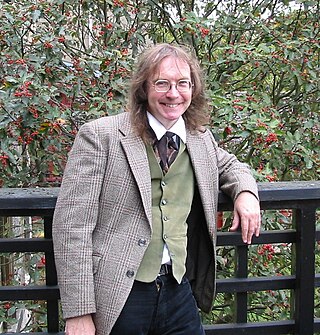
Ronald Edmund Hutton is an Indian-born English historian specialising in early modern Britain, British folklore, pre-Christian religion, and modern paganism. A professor at the University of Bristol, Hutton has written over a dozen books, often appearing on British television and radio. He held a fellowship at Magdalen College, Oxford, and is a Commissioner of English Heritage.
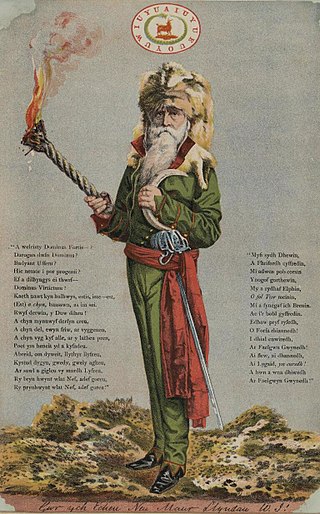
William Price was a Welsh physician and political activist best known for his support of Welsh nationalism, Chartism and involvement with the Neo-Druidic religious movement. Historians have characterised Price as one of the most significant figures in Wales during the Victorian era.

Odd Fellows is an international fraternity consisting of lodges first documented in 1730 in London. The first known lodge was called Loyal Aristarcus Lodge No. 9, suggesting there were earlier ones in the 18th century. Notwithstanding, convivial meetings were held "in much revelry and, often as not, the calling of the Watch to restore order." Names of several British pubs today suggest past Odd Fellows affiliations. In the mid-18th century, following the Jacobite risings, the fraternity split into the rivaling Order of Patriotic Oddfellows in southern England, favouring William III of England, and the Ancient Order of Oddfellows in northern England and Scotland, favouring the House of Stuart.

The Order of Druids (OD) is a fraternal and benefit organisation founded in England, in 1858 after a schism with the United Ancient Order of Druids. Its motto is integritas pro rupe nobis. The order's emblem is a Druid with a harp and a Celtic warrior with the national emblems of United Kingdom, Australia, India and the United States.
Philip Carr-Gomm is an author in the fields of psychology and Druidry, a psychologist, and one of the leaders and former Chosen Chief of The Order of Bards, Ovates and Druids.
A fraternal order is a voluntary membership group organised as an order, with an initiation ritual and traits alluding to religious, chivalric or pseudo-chivalric orders, guilds, or secret societies. Fraternal orders typically have secular purposes, serving as social clubs, cultural organizations and providing a form of social welfare through reciprocal aid or charitable work. Many friendly societies, benefit societies and mutual organisations take the form of a fraternal order.
Events from the year 1781 in Great Britain.

George Godolphin Osborne, 10th Duke of Leeds, JP, styled Earl of Danby from birth until 1872 and subsequently Marquess of Carmarthen until 1895, was a British peer and Conservative politician.
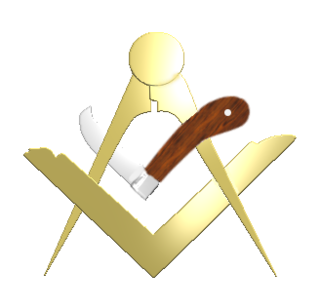
The Order of Free Gardeners is a fraternal society that was founded in Scotland in the middle of the 17th century and later spread to England and Ireland. Like numerous other friendly societies of the time, its principal aim was the sharing of secret knowledge linked to the profession and mutual aid. In the 19th century, its activities of mutual insurance became predominant. By the end of the 20th century, it had become almost entirely extinct, but that can be revised due to some growth in the early 21st century.
The Druid Order is a contemporary druidry fraternal order, founded in 1909 by George Watson MacGregor Reid in the United Kingdom. At various times it has also been known as The Ancient Druid Order, An Druidh Uileach Braithreachas, and The British Circle of the Universal Bond. Initiated members are called companions.
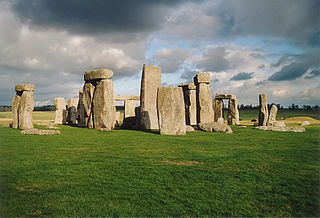
The Modern Pagan movement in the United Kingdom is primarily represented by Wicca and Neopagan witchcraft, Druidry, and Heathenry. 74,631 people in England, Scotland and Wales identified as either as Pagan or a member of a specific Modern Pagan group in the 2011 UK Census.

Francis Richard Charles Guy Greville, 5th Earl of Warwick, styled Lord Brooke until 1893, was a British Conservative politician.

Rollo Maughfling is the Archdruid of Stonehenge and Britain. He is a long-time campaigner for the restoration of traditional rights of access to druidic sites, and respect for ancient druidic rituals. He is also a founder member of the Council of British Druid Orders.

Druidry, sometimes termed Druidism, is a modern spiritual or religious movement that promotes the cultivation of honorable relationships with the physical landscapes, flora, fauna, and diverse peoples of the world, as well as with nature deities, and spirits of nature and place. Theological beliefs among modern Druids are diverse; however, all modern Druids venerate the divine essence of nature.

The Pagan Religions of the Ancient British Isles: Their Nature and Legacy is a book of religious history and archaeology written by the English historian Ronald Hutton, first published by Blackwell in 1991. It was the first published synthesis of the entirety of pre-Christian religion in the British Isles, dealing with the subject during the Palaeolithic, Neolithic, Bronze Age, Iron Age, Roman occupation and Anglo-Saxon period. It then proceeds to make a brief examination of their influence on folklore and contemporary Paganism.
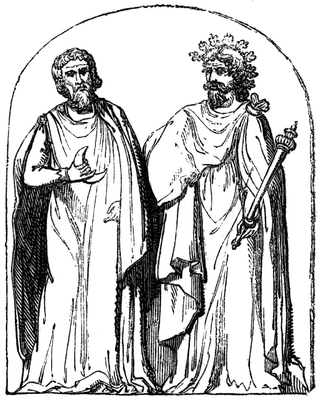
A druid was a member of the high-ranking priestly class in ancient Celtic cultures. Druids were religious leaders as well as legal authorities, adjudicators, lorekeepers, medical professionals and political advisors. Druids left no written accounts. While they were reported to have been literate, they are believed to have been prevented by doctrine from recording their knowledge in written form. Their beliefs and practices are attested in some detail by their contemporaries from other cultures, such as the Romans and the Greeks.
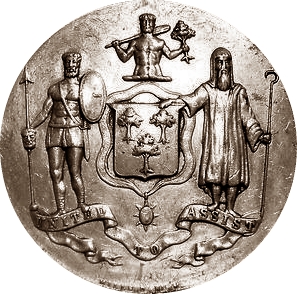
The United Ancient Order of Druids (UAOD) is a fraternal organisation founded in England, in 1833 after a schism with the Ancient Order of Druids. Its motto is United to assist.

















